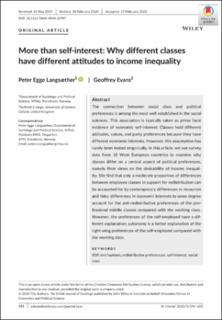| dc.contributor.author | Langsæther, Peter Egge | |
| dc.contributor.author | Evans, Geoffrey | |
| dc.date.accessioned | 2020-11-23T14:13:31Z | |
| dc.date.available | 2020-11-23T14:13:31Z | |
| dc.date.created | 2020-09-21T00:22:26Z | |
| dc.date.issued | 2020 | |
| dc.identifier.citation | British Journal of Sociology. 2020, 71 (4), 594-607. | en_US |
| dc.identifier.issn | 0007-1315 | |
| dc.identifier.uri | https://hdl.handle.net/11250/2689161 | |
| dc.description.abstract | The connection between social class and political preferences is among the most well established in the social sciences. This association is typically taken as prima facie evidence of economic self‐interest: Classes hold different attitudes, values, and party preferences because they have different economic interests. However, this assumption has rarely been tested empirically. In this article, we use survey data from 18 West European countries to examine why classes differ on a central aspect of political preferences, namely their views on the desirability of income inequality. We find that only a moderate proportion of differences between employee classes in support for redistribution can be accounted for by contemporary differences in resources and risks; differences in economic interests to some degree account for the anti‐redistributive preferences of the professional middle classes compared with the working class. However, the preferences of the self‐employed have a different explanation; autonomy is a better explanation of the right‐wing preferences of the self‐employed compared with the working class. | en_US |
| dc.language.iso | eng | en_US |
| dc.publisher | Wiley | en_US |
| dc.rights | Navngivelse 4.0 Internasjonal | * |
| dc.rights.uri | http://creativecommons.org/licenses/by/4.0/deed.no | * |
| dc.title | More than self‐interest: Why different classes have different attitudes to income inequality | en_US |
| dc.type | Peer reviewed | en_US |
| dc.type | Journal article | en_US |
| dc.description.version | publishedVersion | en_US |
| dc.source.pagenumber | 594-607 | en_US |
| dc.source.volume | 71 | en_US |
| dc.source.journal | British Journal of Sociology | en_US |
| dc.source.issue | 4 | en_US |
| dc.identifier.doi | 10.1111/1468-4446.12747 | |
| dc.identifier.cristin | 1831470 | |
| dc.relation.project | Norges forskningsråd: 274558 | en_US |
| dc.description.localcode | This is an open access article under the terms of the Creative Commons Attribution License, which permits use, distribution and reproduction in any medium, provided the original work is properly cited. © 2020 The Authors. The British Journal of Sociology published by John Wiley & Sons Ltd on behalf of London School of Economics and Political Science | en_US |
| cristin.ispublished | true | |
| cristin.fulltext | original | |
| cristin.qualitycode | 2 | |

